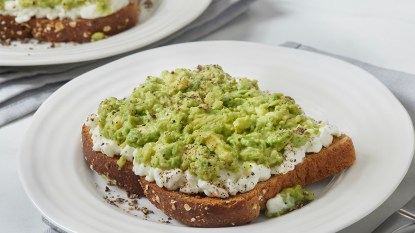What Is Intuitive Eating — And Will It Actually Help You Lose Weight?
First of all, it's not a diet.

You’ve probably heard the phrase “intuitive eating” flying around lately, but what exactly is it? Well, think back to when the kids you know were babies (before they got picky) and they would happily chow down on food as long as they still felt hungry. As soon as that hunger was gone, they’d refuse to take another sip of milk or bite of mushy food.
That’s the type of intuition for eating we’re all born with, but lose as we grow up. Whether you were a proud member of the Clean Plate Club or forced to finish your veggies before you could get up from the dinner table, most of us experience some sort of shift in perspective about food. It’s one that only gets worse as we get older and start letting our emotions take over our eating habits or get stuck in a never-ending cycle of fad diets.
This is exactly what dietitians Evelyn Tribole and Elyse Resch wanted to help people overcome when they created intuitive eating back in 1995. First of all, it is not a diet – although it is totally possible and even likely you’ll lose weight while following it. That’s why it’s had such a resurgence lately with people who have finally fixed their relationship with food and found a healthier lifestyle along with it.
There’s no counting calories, carbs, or points. Just listening to our bodies. No really, actually listening to it — not our emotions or a number on a scale.
It’s similar to mindful eating, but Tribole and Resch list 10 principles that can help you get in touch with what our bodies are telling us:
Reject the Diet Mentality
How many times have you tried a trendy new diet, only to have it backfire? Well, it’s time to give them all up. “If you allow even one small hope to linger that a new and better diet or food plan might be lurking around the corner, it will prevent you from being free to rediscover Intuitive Eating,” Tribole and Resch explain on their website.
Honor Your Hunger
AKA: Stop starving ourselves with restrictions! Whether it’s the time we’re eating or the type of food, we shouldn’t be trying to make ourselves hungrier. “Once you reach the moment of excessive hunger, all intentions of moderate, conscious eating are fleeting and irrelevant.”
Make Peace with Food
We’ve all been there — we tell ourselves we can’t eat certain “bad” foods and ultimately find ourselves constantly fixating on how much we really, really want them. “If you tell yourself that you can’t or shouldn’t have a particular food, it can lead to intense feelings of deprivation that build into uncontrollable cravings and, often, bingeing.”
Challenge the Food Police
Part of making peace with food is evicting the judgement of others from your brain. “The police station is housed deep in your psyche, and its loudspeaker shouts negative barbs, hopeless phrases, and guilt-provoking indictments. Chasing the food police away is a critical step in returning to Intuitive Eating.”
Respect Your Fullness
Remember those babies who turn away from food when they’re full. Yep, we’re telling you to act like a baby, even as a grown up. “Listen for the body signals that tell you that you are no longer hungry. Observe the signs that show that you’re comfortably full. Pause in the middle of eating and ask yourself how the food tastes, and what your current hunger level is.“
Discover the Satisfaction Factor
Aside from just choosing food that sounds good and what our body is actually hungry for, this idea also emphasises making ourselves comfortable in our environment when we eat. “By providing this experience for yourself, you will find that it takes just the right amount of food for you to decide you’ve had ‘enough.’”
Cope with Your Emotions with Kindness
This is where emotional eating comes into play. Anxiety, frustration, sadness — anything can trigger us to eat more than we should. “Food won’t fix any of these feelings. It may comfort for the short term, distract from the pain, or even numb you. But food won’t solve the problem. If anything, eating for an emotional hunger may only make you feel worse in the long run.”
Respect Your Body
Big or small, our bodies are the only one we’ve got. “Just as a person with a shoe size of eight would not expect to realistically squeeze into a size six, it is equally futile (and uncomfortable) to have a similar expectation about body size.”
Exercise — Feel the Difference
Basically, don’t get hung up on how long a workout is or what the numbers on a machine at the gym say. “If you focus on how you feel from working out, such as energized, it can make the difference between rolling out of bed for a brisk morning walk or hitting the snooze alarm.”
Honor Your Health with Gentle Nutrition
Beating ourselves up over eating those “bad” foods every now and then only fuels the guilt and starts the self-defeating cycle all over again. “You will not suddenly get a nutrient deficiency or become unhealthy, from one snack, one meal, or one day of eating. It’s what you eat consistently over time that matters. Progress, not perfection, is what counts.”
You can check out Tribole and Resch’s books Intuitive Eating, 4th Edition: An Anti-Diet Revolutionary Approach ($17.09, Amazon) and The Intuitive Eating Workbook: Ten Principles for Nourishing a Healthy Relationship with Food ($16.69, Amazon) for more of their advice on re-wiring your brain to a healthier eating lifestyle.
At the end of the day, it’s all about being truly honest with ourselves and doing what makes us feel our best!
We write about products we think our readers will like. If you buy them, we get a small share of the revenue from the supplier.













